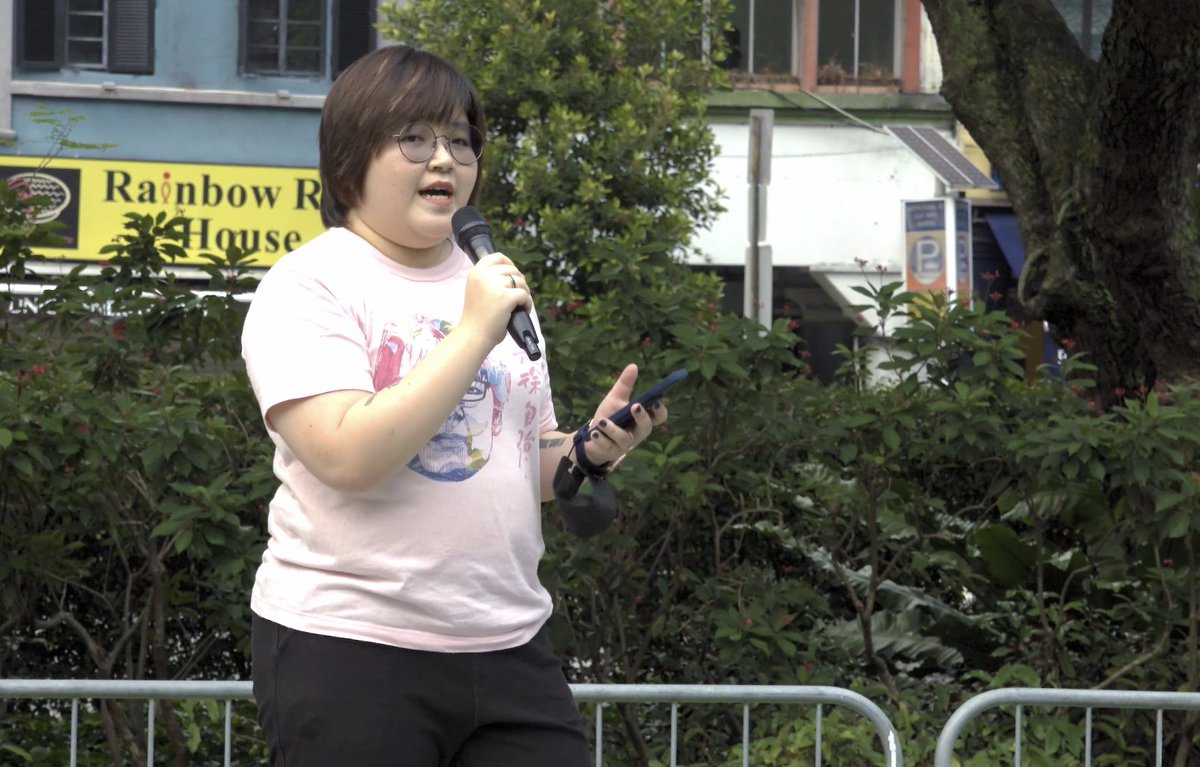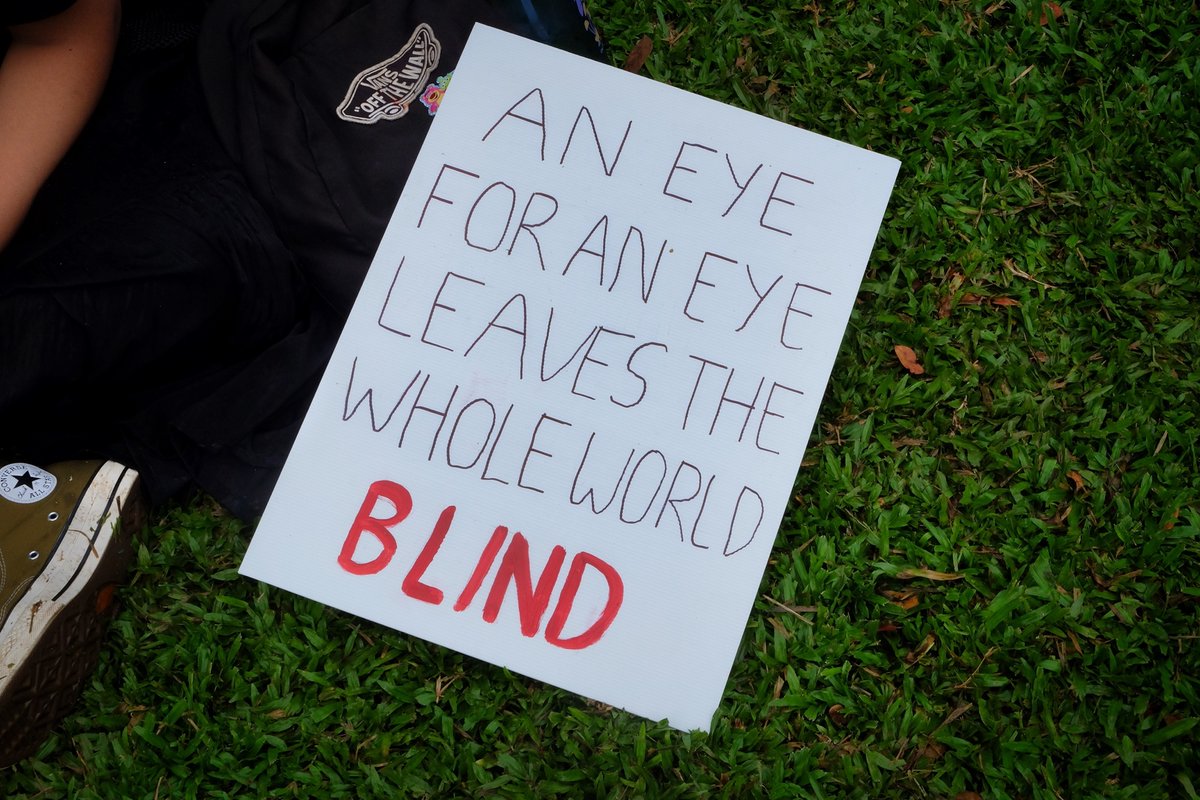
🧵 A thread to share the speech (with some edits to fit Twitter limits) that I gave in Hong Lim Park yesterday at the protest against the #deathpenalty in #Singapore, with further references in [ ].
⬇️⬇️⬇️
⬇️⬇️⬇️
Thank you all for coming down today, despite the rain and the damp and the humidity.
By showing up, you’ve demonstrated your opposition to state violence in all our names.
By showing up, you’ve demonstrated your opposition to state violence in all our names.

By showing up, you’re also showing the many family members and loved ones of people on death row that there are people who stand with them. 

This is a powerful act of solidarity, in a country where family members of prisoners on death row encounter callous comments that flippantly dismiss the humanity of the people they love.
To all these families, I would like to say that we see you and we stand with you.
To all these families, I would like to say that we see you and we stand with you.

The T-shirt that I’m wearing today says “We are all Hsu Tzu-Chiang.” Hsu Tzu-Chiang is a man who spent 16 years on death row in Taiwan for kidnap and murder, until he was released in 2012. 

In 2016, I attended a workshop in Taipei for death penalty abolitionists in Asia. The organisers gave each of us this shirt. Hsu Tzu-Chiang was there to present it to us in person. 

I bring this up today to highlight that this is not just our fight in Singapore. Although there is a clear trend of countries moving towards abolition, the death penalty is still retained in far too many jurisdictions.
Although there's evidence that punitive criminal approaches to drugs do not work, there are 35 countries that retain the death penalty for drug offences, and others in which a “War on Drugs” has already claimed countless lives in extrajudicial killings and other atrocities.
[ @rapplerdotcom's reporting on Duterte's drug war in the Philippines: rappler.com/newsbreak/iq/r… ]
In every jurisdiction that imposes capital punishment, wrongful convictions and executions are inevitable.
Hsu Tzu-Chiang could have been executed in Taiwan for something he did not do.
international.thenewslens.com/article/83068
Hsu Tzu-Chiang could have been executed in Taiwan for something he did not do.
international.thenewslens.com/article/83068
Last year, @DPInfoCtr in the United States reported that, since the 1970s, about one in eight death penalty convictions in the country were wrongful, and eventually resulted in exoneration.
deathpenaltyinfo.org/facts-and-rese…
deathpenaltyinfo.org/facts-and-rese…
There are multiple reports from around the world of people who had already been executed before miscarriages of justice were discovered. We can never bring them back.
[ Wrongful conviction in Japan: theguardian.com/world/2014/mar… ]
[ Wrongful execution in Taiwan: bbc.com/news/world-asi… ]
[ Wrongful execution in China: bbc.com/news/world-asi… ]
[ Wrongful convictions in the United States: nationalgeographic.com/history/articl… ]
[ Wrongful execution in the United States: theguardian.com/world/2012/may… ]
In Singapore, we narrowly escaped a wrongful execution in 2020 when the Court of Appeal set aside Gobi Avedian’s death sentence.
wethecitizens.net/singapore-esca…
wethecitizens.net/singapore-esca…
Gobi had actually already exhausted the standard legal avenues; his clemency appeal had even been rejected. If not for a late-stage court application, Gobi could have been executed.
These are only a few examples. There are so many, far too many, more. There is already so much suffering in the world; state-sanctioned killing does nothing but add more. 

In every society with the death penalty, this act of state violence spreads pain and grief and trauma that ripples out beyond the confines of execution chambers into the hearts of families and throughout the community. 

Capital punishment is a brutal system that makes brutes of us all. It appeals to our worst instincts for violence and blood, distracting us from compassion and mercy and true justice.
Instead of pushing us to address inequalities and exploitative and oppressive systems that leave people marginalised and unsupported, it makes us the worst version of ourselves. 

Today, we stand in solidarity with all the activists and advocates, lawyers and human rights defenders, and, most importantly, the families, communities, and people affected by capital punishment all over the world.
@ADPANetwork @cpjp_org_au @Reprieve @DeathPenaltyP
@ADPANetwork @cpjp_org_au @Reprieve @DeathPenaltyP
The struggle for abolition is a difficult one. The people confined to their cells on death row depend on those of us outside to speak up and take a stand. Their friends and family cannot take on the fight for their lives alone.
Only when we stand together, when we practice compassion and care in defiance of a regime that turns killing into an administrative act, can we keep one another strong and push forward. 

Thank you again, everyone, for being here today and being part of this movement. #AbolishDeathPenalty #NotInOurName 

If you would prefer to read this speech unrolled, you can find it here: kirstenhan.com/blog/2022/4/4/…
Adding to the thread:
https://twitter.com/kixes/status/1511207327667728384?s=20&t=aJGck0sfJiBbemU_PhQdRA
• • •
Missing some Tweet in this thread? You can try to
force a refresh





